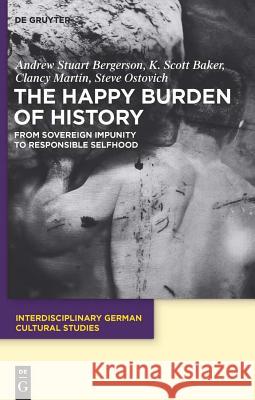The Happy Burden of History: From Sovereign Impunity to Responsible Selfhood » książka
The Happy Burden of History: From Sovereign Impunity to Responsible Selfhood
ISBN-13: 9783110246360 / Angielski / Twarda / 2011 / 262 str.
The Happy Burden of History: From Sovereign Impunity to Responsible Selfhood
ISBN-13: 9783110246360 / Angielski / Twarda / 2011 / 262 str.
(netto: 567,71 VAT: 5%)
Najniższa cena z 30 dni: 518,08
ok. 30 dni roboczych.
Darmowa dostawa!
The series publishes monographs and edited volumes that showcase significant scholarly work at the various intersections that currently motivate interdisciplinary inquiry in German cultural studies. Topics span German-speaking lands and cultures from the 18th to the 21st century, with a special focus on demonstrating how various disciplines and new theoretical and methodological paradigms work across disciplinary boundaries to create knowledge and add to critical understanding in German studies. The series editor is a renowned professor of German studies in the United States who penned one of the foundational texts for understanding what interdisciplinary German cultural studies can be. All works are peer-reviewed and in English. Three new titles will be published annually. About the series editor:
Irene Kacandes is the Dartmouth Professor of German Studies and Comparative Literature at Dartmouth College, Hanover, New Hampshire. She received three degrees from Harvard University and also studied at the Free University of Berlin and Aristotle University in Thessaloniki, Greece. She publishes on a wide range of interdisciplinary topics including secondary orality, rhetoric, aesthetics, trauma, witnessing, family and generational memory, experimental life writing, Holocaust testimony, and narrative theory. She has lectured widely in the United States and Europe and currently serves as President of the International Society for the Study of Narrative and Vice President of the German Studies Association.
What can well-meaning people do about terror and genocide? The more we fight against systems of violence, the further we seem to sink into them. This book explores the lives and letters of ordinary and intellectual Germans who faced the ethical challenges of the Third Reich. Trained in history, literary criticism, philosophy, and theology, its four authors look at the role of myths, lies, non-conformity, irony, and modeling in cultivating a self . They explain how we might use these ordinary strategies of selfhood to bear the burden of historical responsibility - and be happy doing so.











